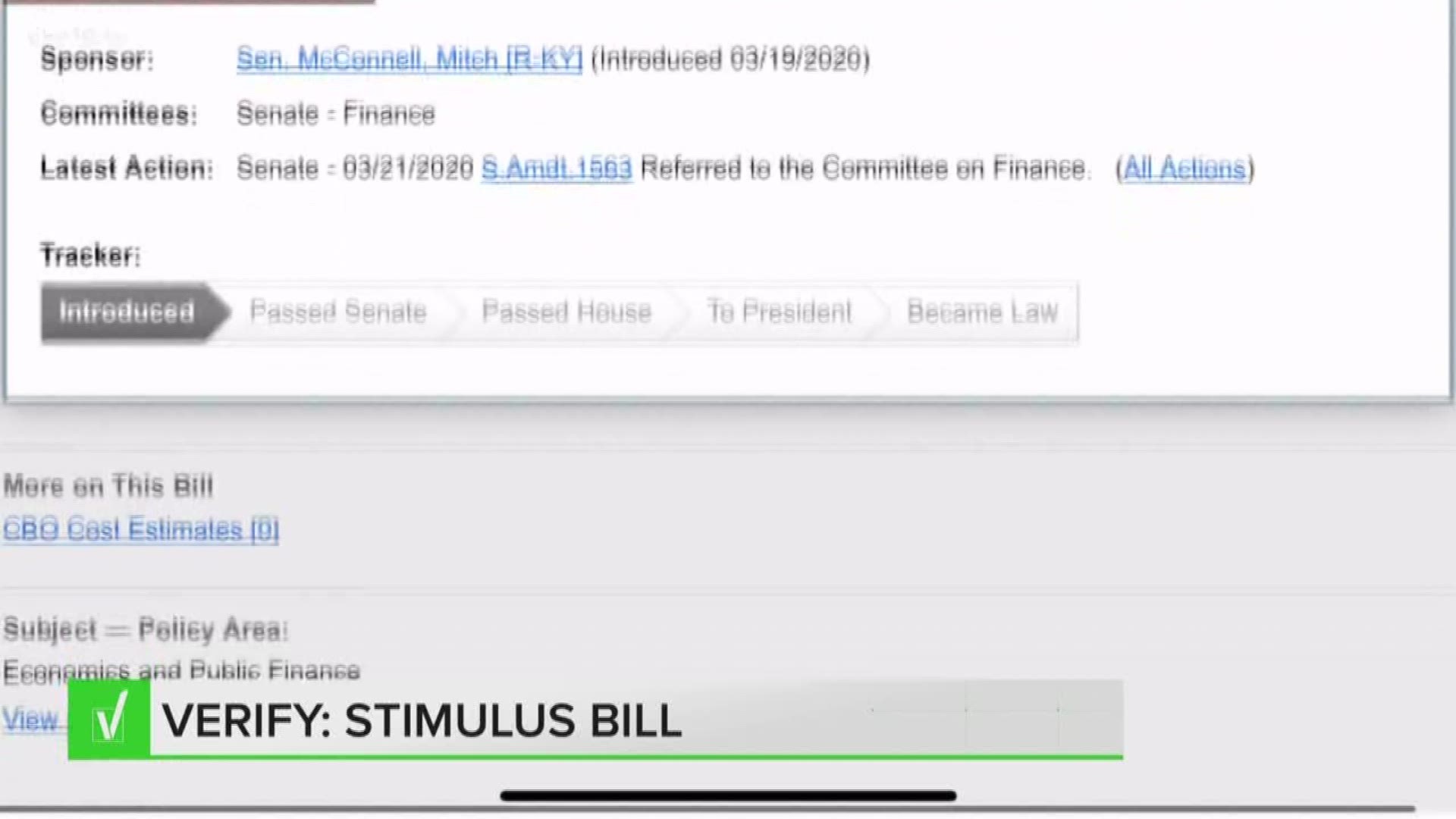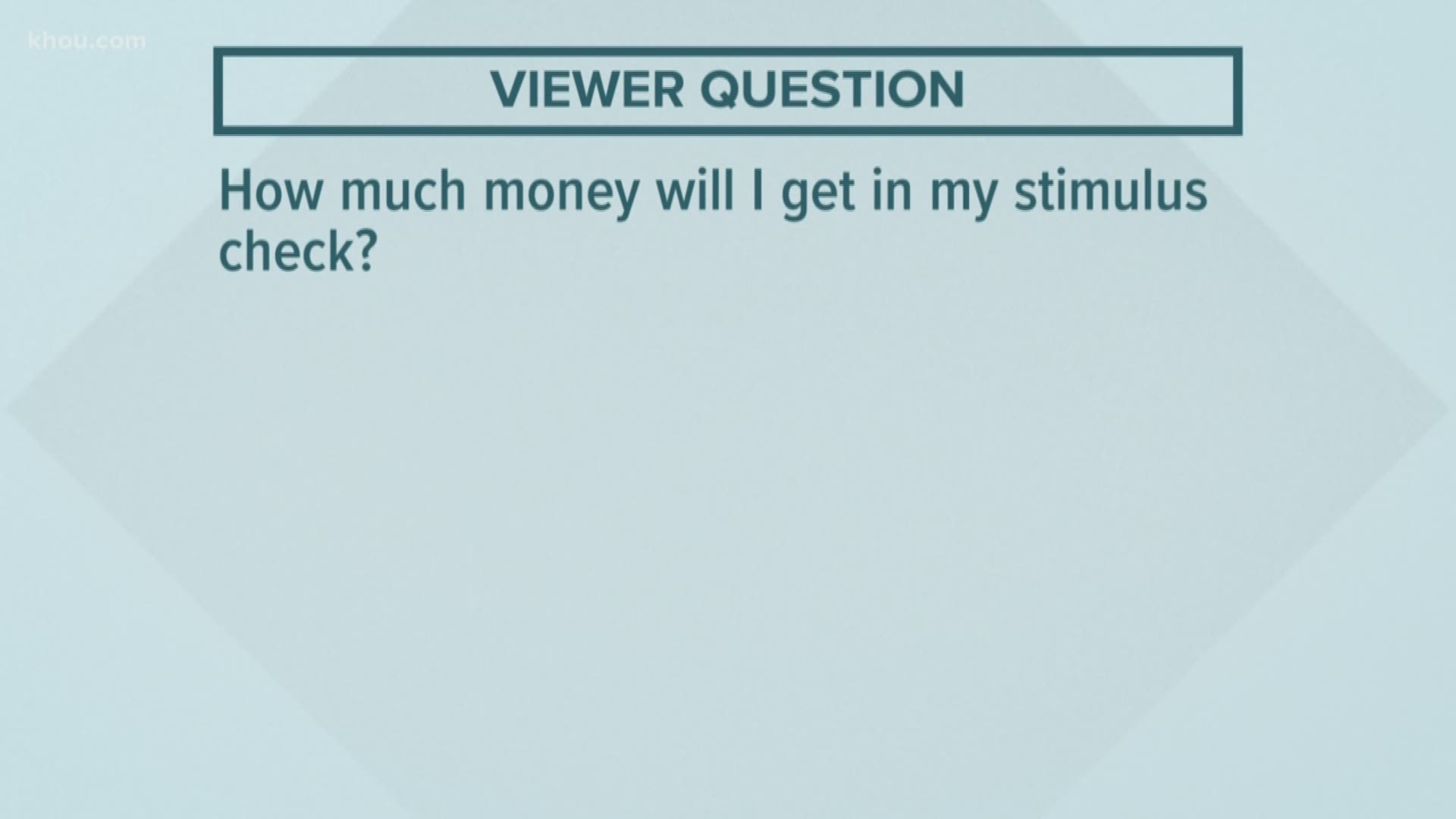TYLER, Texas — The stimulus bill signed by President Donald Trump Friday will provide a lifeline for millions of people as the country tries to get through the COVID-19 pandemic.
With so much money involved, a lot of people have questions.
The “Coronavirus Aid, Relief, and Economic Security Act” or “CARES Act,” will cost approximately $2.2 trillion, making it the largest relief bill in U.S. history.
If an individual makes less than $75,000, they will get a payment of $1,200, and a household earning less than $150,000 combined will get a payment of $2,400. The payment goes down if anyone earns more than that. Anyone earning more than $100,000 gets nothing. Anyone with dependent children 16 years or younger gets an additional $500 for each child.
Diane Baker sent a question to CBS19’s Verify team asking, “If, and when, the stimulus checks come, will they be considered ‘income’ with our next year’s earnings, thus, being taxable income?”
“The checks are not taxable income,” said Nicole Kaeding, an economist and Vice President of Policy Promotion with the National Taxpayers Union Foundation. “They are actually tax credits. They are just going to be advanced to you this year instead of applying to next year’s tax return.”
Patricia Crane wrote to ask, “If I did not file a tax return for a few years according to the wording of the bill, am I going to need to file some kind of claim for the check?”
“First, the Treasury Department will use previous tax returns to identify individuals who qualify,” Kaeding explained. “Next, they will actually use Social Security information, as well. So, individuals that received Social Security benefits likely do qualify. The important caveat, however, is if that individual is claimed as a dependent on someone else’s tax return. In that situation, they won’t qualify. But, for most seniors and retirees, that collect Social Security benefits, they should expect to receive a check here, as well.”
Kaeding added that that applies to someone who receives disability checks, as well.
Sarah Knepper asked, “Income based off of 2018? We haven’t filed taxes for 2019 yet?”
Kaeding said yes, the IRS will use the most recent year’s information it has on file. She explained, though, that payments will be based on 2020 income.
She mentioned that many people may have fallen in one income bracket in the past and a different bracket this year.
“What the law says, however, is that the math will always work in your favor,” Kaeding stated. “If, when you file your taxes in 2021, they didn’t send you enough money, they’ll add it to your tax return then. And if they sent you too much, you don’t need to send it back.”
Hunter Jarrett was looking to the future when he asked, “How will this impact currency inflation, and what can I expect today’s dollar to be worth in 3-5 years?”
Kaeding says she did not believe the stimulus plan would have a substantial impact on inflation because it is meant to keep the economy stable. She acknowledged the impact the stimulus and the economic shutdown would have on the national debt but said this payment could be a good investment.
“We obviously will need to pay the principal back,” Kaeding said. “But right now, the federal government can borrow for 10 years at less than one percent interest. That interest is a fairly small cost, and the bond markets are suggesting that they trust the full faith and credit of the U.S. government and that we will find a way to pay these debts in the future.
“And that doesn’t even include the impact of inflation. So, if we think about a one-percent interest rate right now on a 10-year bond, inflation over the next 10 years will be more than one percent. So, in essence, the federal government is getting paid to borrow money right now.”
THE WRAP UP
Who is eligible for a recovery rebate?
All U.S. residents with adjusted gross income under $75,000 ($112,500 for head of household and $150,000 married), who are not the dependent of another taxpayer and have a work-eligible Social Security Number, are eligible for the full $1,200 ($2,400 married) rebate. They are also eligible for an additional $500 per child. A typical family of four is eligible for a $3,400 recovery rebate.
What about taxpayers with adjusted gross income over $75,000 ($112,500 for head of household and $150,000 married)? Are they eligible to receive any rebate?
The rebate amount is reduced by $5 for each $100 that a taxpayer’s income exceeds the phase-out threshold. The amount is completely phased-out for single filers with incomes exceeding $99,000, $146,500 for head of household filers with one child, and $198,000 for joint filers with no children. For a typical family of four, the amount is completely phased out for those with adjusted gross incomes exceeding $218,000.
What if my income was above the threshold in 2019, but I’ve lost my job due to the corona virus? Can I still get a rebate check?
If your income in 2019 was in the phase-out range you would still receive a partial rebate based on your 2019 tax return. However, the rebate is actually an advance on a tax credit that you may claim on your 2020 tax return. If your income is lower in 2020 than in 2019, any additional credit you are eligible for will be refunded or reduce your tax liability when you file your 2020 tax return next year.
Is the rebate taxable or will I have to pay back any amount if the rebate based on my 2019 return is larger than what it would be if based on my 2020 tax year return?
No, the rebate is treated like other refundable tax credits, such as the child tax credit and earned income tax credit, and not considered income. Moreover, if the credit amount you qualify based on 2020 income is less than what you qualify for based on your 2019 tax return, it does not have to be paid back.
Who qualifies as a child for purposes of the rebate?
Any child who is a qualifying child for the purposes of the Child Tax Credit is also a qualifying child for the purposes of the recovery rebate. In general, a child is any dependent of a taxpayer under the age of 17.
Do dependents, other than children under 17, qualify a taxpayer for an additional $500 per dependent?
No, the additional $500 per child is limited to children under 17.
Are individuals with little to no income or those on means-tested federal benefits, such as SSI, eligible for a recovery rebate?
Yes, there is no qualifying income requirement. Even individuals with $0 of income are eligible for a rebate so long as they are not the dependent of another taxpayer and have a work-eligible SSN.
Are seniors whose only income is from Social Security or a veteran whose only income is a veterans’ disability payment eligible?
Yes, as long as they are not the dependent of another taxpayer. The bill also provides IRS with additional tools to locate and provide rebates to low-income seniors who normally do not file a tax return by allowing them to base a rebate on Form SSA-1099, Social Security Benefit Statement or Form RRB-1099, which is the equivalent of the Social Security statement for Railroad Employees. However, seniors are still encouraged to file their 2019 tax return to ensure they receive their recovery rebate as quickly as possible.
Are college students eligible for a recovery rebate?
Only if they are not considered a dependent of their parents. Generally, a full-time college student under the age of 24 is considered a dependent if their parent(s) provide more than half of their support.
I am eligible for a rebate, what do I have to do to receive it?
For the vast majority of Americans, no action on their part will be required to receive a rebate check since the IRS will use a taxpayer’s 2019 tax return if filed or their 2018 return if they haven’t filed their 2019 return. This includes many individuals with very low income who file a tax return despite not owing any tax in order to take advantage of the refundable Earned Income Tax Credit and Child Tax Credit.
What should I do if I did not file a tax return for 2019 or 2018?
The best way to ensure you receive a recovery rebate is to file a 2019 tax return if you have not already done so. This could be accomplished for free online from home using the IRS Free File Program. The bill also instructs the IRS to engage in a public campaign to alert all individuals of their eligibility for the rebate and how to receive it if they have not filed either a 2019 or 2018 tax return.
If I have a past due debt to a federal or state agency, or owe back taxes, will my rebate be reduced?
No, the bill turns off nearly all administrative offsets that ordinarily may reduce tax refunds for individuals who have past tax debts, or who are behind on other payments to federal or state governments, including student loan payments. The only administrative offset that will be enforced applies to those who have past due child support payments that the states have reported to the Treasury Department.
Individuals should consult the IRS or a tax adviser to address questions related to their individual circumstances.
If you have a question or concern you would like verified, email dlippman@cbs19.tv or send him a note on Facebook or Twitter.


